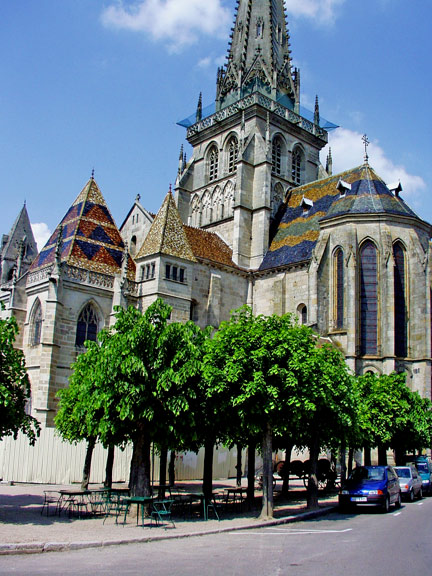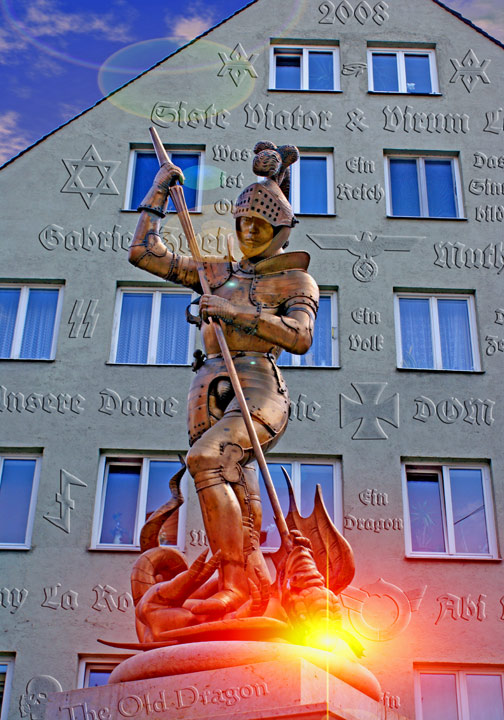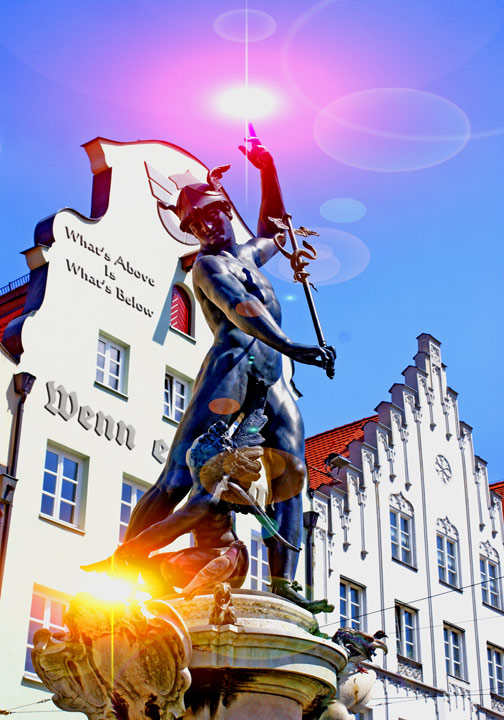|
|
|
 |
|
|
 |
Honorius Augustodunensis was commonly known as Honorius of Autun, although he was not, in fact, very commonly known at all. Skippy and Honor share something in common - both of them were called [in their youth] "the Great Unknown." Very little has been gathered about the personal details of Honor's life. Some fool recorded that he had died around 1150 or so. Barber Perfect and Lucky just laugh at that. Barber doesn't try to hide it anymore - for reasons which will unfold - and he will flat out say it: Honorius of Autun was Barber's "Second Skin." So searching for birth and death dates is a game for those who actually believe in History the way it has been taught. He refers to himself in his writings as "Honorius Augustodunensis ecclesiæ presbyter et scholasticus" - Honor of "?" priest of the church and scholar. Now the reason for that "?" is that the word Augustodunensis - which means "native of Augst" - is the Latin form of at least 2 different cities: Autun, in France - and also Augsburg, in Swabia - which today is in Bavaria in Germany. To confuse things more, there is also an Augst near Basle in today's Switzerland. Worse - some Etics, undoubtedly crazed by a serious Meth habit, claim that Honor was a monk of St. Augustine's at Canterbury and point to his associations with John the Scott - the Irish Philosopher. Honor spent his last traceable years in the Scots Monastery in Regensburg "back" in Bavaria. The oldest Manuscripts which refer to him brand him as "solitarius." Lucky grins. That could mean he was a Monk, or it could mean that he was a Hermit. An "Inclusus." History does note that there was an Irish "Mission" to Bavaria in the 12th Century and the monks were "Inclusi." Hermits. History also records that Honorius of Wherever "flourished between the years 1106 - 1135 in Southern Germany." But that he had once been a Student of Anselm at Canterbury. The good Ritter von Vollendette says that Honorius finally split with Anselm over the issue of the Crusades. All in all this pretty picture of the Cathédral in Autun, France is probably wasted since very few Etics believe that he was ever in the town long enough to be claimed "from there." Barber says to think Bavarian on this one and reminds us all that in 1150 there was no such thing as Germany. |
|
|
"Heady days," says Barber. The Happy Time as the later U-Boat Captains would describe a similar milieu. And seriously you'd have to be a Linguistic fool to miss it: all the vocabulary & Idioms which glossed back to a Germanic tongue and not a French one. And the constant references to contemporary events in the "German" States and Free Cities. And you can tell it's still a thorn in Barber's paw, so to speak. He once told me an apocryphal tale of an argument he had had with a French Historian over the French "Theft" of Honorius of Augsburg. The Frog could not be convinced by the Linguistic evidence - as if the language an author uses simply doesn't matter at all. As if the Latin that all Euro-Scholars used was completely Transparent and you could pour any tongue into it and it would all come out the same. Modern Etics identify the Native Tongue of a Medieval author by the "kinds" of Latin that the author uses. The Medieval mind was wholly Allegorical and that meant that any author would be forced to use Idioms and Metaphors - both of which are easily tracked back to their Linguistic sources. Honorius used Latin strained thru the Prism of a Germanic language. You can't really hide in words. Your "Selections" will give you away. They always do. It's like the Cohen Gene. Mutations are footprints in the snow. Like the Marga of the Atman. |
|
 |
|
 |
No matter where he came from, Honorius was a Founding Father of the Western Mentalité. I was going to write "Western Christian Mentalité," but we do not need that Modification. Honorius really is "The Great Unknown." Hardly anyone - including the well-educated, has ever heard of him. Yet they are walking around with the remnants of his Organization still acting as Mental Filters, Lenses, and Pop-Up Blockers. Nietzsche understood how long it would take before Western Man would ever - again - see the Cosmos without Christian acts of Selection, without Christian Biases. In any Christian Pulpit, this Sunday, will hover the ghost of Honorius of Autun. The way the Priest or Preacher will "Sermonize" will be directly traceable to his influence on the early Medieval Christian Church. Since this is all about Analogy, let me put it to you like this: Honorius is to the Mind of the Medieval and its Antecedents that way that Bob Dylan is to the Music of the Postmodern and its Antecedents It is impossible to over-estimate the influences each had on their cultures. But even Bob would have to admit that his Musical Structures, both in music and lyrics, are based on work that is way older than himself. Part of that work would be based on the writings of Honorius. Imago Mundi is the best known. The full title is: Imago Mundi, de Dispositione Orbis. It's a huge compendium of Popular Cosmology, Astrology, Weather, and History. The Image of the World - notice how he uses the Speculum /Mirror icon without ever saying it. It was translated into all the Vernacular languages and became the most popular "Best-Seller" of its ages. No one knew anything about the author except that they now possessed a copy of his Mind. The little people loved it for the way it plotted out the duties and means of the Guardian Angels. That fuckin' puppy was a genius stroke! It was the Hook in the Melody. You give a Serf his own Angel and you can get that idjit to dive on a grenade. He wrote Speculum Ecclesiæ, like Kerouac wrote On the Road - in a Benzedrine Fury with heavy Amphetamine overtones. It was a book of stock Sermons organized around the Liturgical Year. Gemma animæ was his attempt to put Catholic Liturgy into Allegory. His Sigillum Sanctæ Maria was a set of lessons to unveil the mysteries of Mary's Assumption - Body & Soul - into Heaven. He was ahead of the curve with his championship of Mary. His prose was refreshingly non-scholastic. He used Humor, Pathos, and Bathos. He did more to popularize Christianity and the workings of the Church than anyone before or for a long time after. |
|
|
|
These last two images are from Augsburg, the top 2 are from Autun. Barber said that for a long while he had encouraged the confusion over the "Augustodunensis." When you have to Pop Smoke every generation or so you learn to obfuscate the trails that all of your selves have taken. So you use a lot of names. Bury the ignorant bastards in countless appellations. If the 7th Wound was either watching you, or looking for you, then you needed to be a Master of Masks and Confabulations. It was, however, Honor's treatise "De Hæresibus," that was Barber's pride and joy. He told Lucky that he had labored on it - silently - for years. It was one of the first works on the Heretics of the old Pagan world: the Platonists, with their Ideals; the Pythagoreans, with their Mystical Numbers; and the Stoics, with their "Let it Be." Honorius was the 1st to Classify Pagan Heresies by their Mindsets and not just lump them all together as Lucifer Farts. Barber told Lucky that his treatise on the Other Faiths was the 1st Christian act of Counter-Intelligence. It sure changed Barber. His researches opened up for him a new cosmos of Ganz Andere Truths - except the more he looked into the Altkampfers the more he realized the essential rightness of the Heresies - as seen from the Pagan perspective. That bothered him. He didn't really want to admit to other Truths. Shit like that can slow the Sonderkommando down. You plant some Doubt in the Einsatzgrüppen and your Body Count goes south. So he washed himself in the Blood of the Lamb and said to himself: Fuck it! Kill them All. All Monkeys were guilty of Sin and Sin was the "Clean Coal" of its day - plentiful, valuable, with a price to pay. Little Sins just cost Money - up until Gutenberg's 1st Press Indulgences had to be written out by hand and sealed with costly colored waxes. Big Sins sent you on Pilgrimage to spread your wealth at Kiki Shrines and Hospices along the Route. The biggest Sins - Heresy and Infidels - were Cancers on the Faith and had to be cut away. Completely, the sooner the better. He could see it then clearly, back in the 12 Century, and since then he's known what was Necessary. Fuckin' Spinoza! Well, he had finally shut that fucking angel up for good. History says Spinoza died of Lung disease after years of Polishing Lenses. Which was exactly the way it had been planned. Pagans & Heretics were deadly, Honorius of Augsburg thought - because they made sense. There are 4 Logical Ways of Counting the Moon, Barber said, but you could never discover them all until the Moon lost its Soul and you only had to Measure it from its Body.
|
|
 |
|
|
|
|
|
|
|
|
|
|
|
|
|
|
|
|
|
|




